
As electric vehicles grow in proliferation, the need for home charging will increase as well. If you’re looking to add a charging station to your home, there are many charging brands to choose from. To give you a better understanding of the options available, here are the top EV charger brands in Canada.
What to look for in an EV home charging station
Before we get into the top EV charging brands, here are some considerations and things to look for.
Cost
The price tag of a home charger can range from $300 up to $1,500. Installing an EV charger can cost between $3,000 to $5,000. As you can see, charging stations are an expensive investment. Some provinces do offer rebates to cover the purchase of an EV charger. For example, B.C.’s Home EV Charger Rebate program offers a rebate of up to 50% for the purchase and installation of an eligible Level 2 charger, with a maximum amount of $350. While these programs provide some financial relief, make sure you are financially comfortable with buying and installing a home charging unit.
Charging Level
There are three EV charger levels, each with its own charging speeds and power requirements. Level 1 chargers are small, portable, and can be plugged into any standard household outlet. They are ideal for road trips or as a backup option. However, they have slow charge times, the average being 8-50 hours. Level 2 chargers have faster charge times (average of 4-10 hours for a full charge) and provide more power to your EV (16 km-50 km per hour of charging). This level is used by the majority of EV drivers since it is capable of meeting daily driving needs. Level 3 chargers (also known as DC-Fast chargers) have the quickest charge times but have special power requirements and are not suitable for home installation. They are mostly found at public charging stations.
Single or dual-port
Most EV home chargers can come with either one or two charging ports. If you own more than one electric vehicle, a dual port charging station is the better option. Some models even allow for two EVs to charge simultaneously if there is sufficient electrical capacity.
Certification mark
Every EV charging unit sold in Canada must carry an official Canadian certification mark or label of a recognized certification or evaluation agency. This indicates the unit has been assessed for safety. A station that does not have a certification mark could cause harm to the user or damage to the property.
Enclosure rating
This term refers to how well the outside enclosure of a charging station protects it against environmental elements. It also indicates which environments a charger should be used in. There are several enclosure rating systems, but the NEMA (National Electrical Manufacturers Association) is the most commonly used system in North America. The CSA (Canadian Standard Association) system is also widely used in Canada. Understanding a charger’s enclosure will help you decide which brand is right for you in terms of your specific environment and where you park your EV.
*Note: This guide covers residential chargers only. For business/fleet charging stations, click here
FLO
Headquartered in Quèbec, FLO is one of the leading EV manufacturers in Canada. The Flo House™ Charger is their leading product and is noted for its speed and reliability. Three models are available, the X3, X6, and X8.
Flo Home X3 specifications

- Price: $799
- Charging level: Level 2
- Power output: 10.4kW to 12 kW
- Voltage: 208-240 V
- Amperage: 50 A (adjustable from 6 to 50 A)
- Operating temperature: -40°C to 50°C
- Connector type: SAE J1772 and NACS
Flo Home X6 specifications
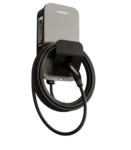
- Price: $999
- Charging level: Level 2
- Power output: 10.4-12 kW
- Voltage: 208-240V
- Amperage: 50 A (adjustable from 6 to 50 A)
- Operating temperature: -40°C to 50°C
- Connector type: SAE J1772 and NACS
Flo Home X8 specifications
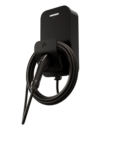
- Price: $1,899
- Charging level: Level 2
- Power output: 16.6 kW-19.2 kW
- Voltage: 208-240V
- Amperage: 80 A (adjustable from 6 to 80 A)
- Operating temperature: -40°C to 50°C
- Connector type: SAE J1772
Each model has adjustable power outputs depending on the voltage selected. For example, the Flo X Home 8 has a maximum power output of 16.6 kW at 208 VAC and 19.2 kW at 240 VAC. With an outdoor temperature rating of -40°C to 50°C, the Flo Home chargers are safe for outdoor installation. The enclosures are also waterproof and are made of impact and corrosion-resistant material. Some additional features of the Flo Home X series include:
- network & mobile app connectivity
- regular firmware updates
- dynamic power-sharing
- advanced scheduling: create up to 5 charging time blocks a day
Tesla
Tesla has been a leading figure in the electric vehicle industry. While the company is known for its EV models, it also has invested heavily in EV charging. Tesla has one of the largest charging networks in the world, with more than 50,000 Superchargers located across the world. Their home charging stations are also popular. The two models offered by Tesla are the Wall Connector and the Universal Wall Connector.
Wall Connector specifications
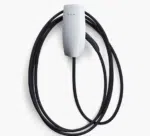
- Price $625
- Charging level: Level 2
- Power output: 2.8-11.5 kW
- Voltage: 240 V
- Amperage: 12-48 A
- Operating temperature: -30°C to 50 °C
- Connector type: NACS with integrated SAE J1772 adapter
Universal Wall Connector specifications
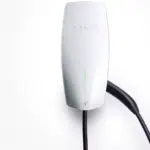
- Price: $860
- Charging level: Level 2
- Power output: 2.8-11.5 kW
- Voltage: 240 V
- Amperage: 12-48 A
- Operating temperature: -30°C to 50 °C
- Connector type: NACS with integrated SAE J1772 adapter
The Tesla Wall Connector can provide up to 71 km of range when charging at an 11.5 km/48 amp output. The charger can be used with the Tesla app, allowing you to monitor and manage your charging sessions. The Wall Connector also has Wi-Fi connectivity for over-the-air updates, remote diagnostics, and access controls. Tesla’s Power Management feature suite can be paired with the Wall Connector to provide fast charging speeds while avoiding costly home electrical upgrades.
The Universal Wall Connector has many of the same features as the standard Wall Connector. However, the Universal Wall Connector comes with an integrated J1772 adapter that can be used with any EV model. The charger can be paired with Tesla’s Powershare technology to optimize its performance. However, this feature is only available for Tesla Cybertruck models.
Ivy
For those living in Ontario, Ivy has one of the most connected and reliable EV charging networks in the province. To give residents home charging, Ivy partnered with Grizzle-E™ to create the Ivy Home™ Smart EV Charger.
Ivy Home Smart EV Charger specifications
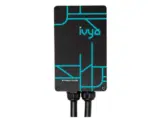
- Price: $699
- Charging level: Level 2
- Power output: 10 kW
- Voltage: 240 V
- Amperage: 40 A
- Operating temperature: -30°C to 50 °C
- Connector type: SAE J1772
The Ivy Home Smart EV Charger was named by the New York Times as the best home EV charger for 2023. It has a power output of up to 9.6 kW with charging speeds of up to 48 km/hour. The charger is compatible with all EV models and is designed to operate in temperatures as low as -30°C. This smart charger has Wi-Fi connectivity, which gives you greater control over your charger. You can schedule future charging sessions and monitor the amount of power being drawn by your EV. Some additional features of the Smart Charger include:
- Wi-Fi connectivity: Allows you to control the charger via the Ivy app.
- Save on public charging: Gives you access to public charging plans at a special monthly rate.
- Portable and compatible with all EV models.
The charger has a SAE J1772 connector type, allowing you to charge most EV models. However, the Ivy Home Smart Charger is not compatible with Tesla models but can be used with an adapter.
Grizzl-E
The Grizzl-e line of EV chargers is manufactured by United Chargers Inc. The three home charging products are the Grizzl-E Classic, Grizzl-E Duo, and Grizzl-E Smart.
*Note: Currently, Girzzl-E chargers do not come with Tesla charging connectors
Grizzl-E Classic specifications
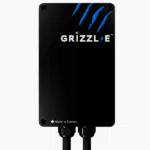
- Price: $499.99
- Charging level: Level 2
- Power output: 10 kW
- Voltage: 240 V
- Amperage: 40 A
- Operating temperature: -30°C to 50 °C
- Connector type: SAE J1772
Grizzl-E Duo specifications
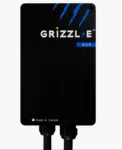
- Price: $1,099
- Charging level: Level 2
- Power output: 10 kW
- Voltage: 240 V
- Amperage: 40 A
- Operating temperature: -30°C to 50 °C
- Connector type: SAE J1772 x2
Grizzl-E Smart specifications
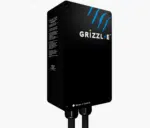
- Price: $600
- Charging level: Level 2
- Power output: 10 kW
- Voltage: 240 V
- Amperage: 40 A
- Operating temperature: -30°C to 50 °C
- Connector type: SAE J1772
Grizzl-E Ultimate specifications

- Price: $649
- Charging level: Level 2
- Power output: 11.5 kW
- Voltage: 240 V
- Amperage: 48 A
- Operating temperature: -30°C to 50 °C
- Connector type: SAE J1772

- Price: $999
- Charging level: Level 2
- Power output: 19.2 kW
- Voltage: 240 V
- Amperage: 80 A
- Operating temperature: -30°C to 50 °C
- Connector type: SAE J1772
Grizzl-E Cyber Ultimate specifications
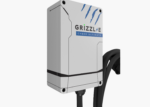
- Price: $99
- Charging level: Level 2
- Power output: 19.2 kW
- Voltage: 240 V
- Amperage: 80 A
- Operating temperature: -30°C to 50 °C
- Connector type: NACS
The Grizzl-E Classic, Duo, and Smart home chargers are capable of providing up to 10kW of power for your EV. Both chargers have a durable aluminum enclosure for safe operation in temperatures ranging from -30° to 50°C. Each charger has an SAE J1772 connector type with NEMA 14-50 and NEMA 6-50 plugs, making it compatible with almost all battery electric and plug-in hybrid models. The Ultimate models come in either 48 amp or 80 amp configurations. Unfortunately, the Classic, Smart, Duo, and Ultimate models are not compatible with Tesla EVs, but drivers can purchase a J1772 to Tesla charging adapter. The Cyber Ultimate charger has an NACS connector type for Tesla EVs. Additional features of the Smart EV chargers include:
- Dynamic power sharing: Enables you to charge two vehicles simultaneously
- Scheduling
- Usage tracking
- Charger monitoring
Elmec
Elmec is one of the most popular charging manufacturers in Québec. Their three charging stations are the EVduty-50 fixed charging station, the EVduty-50 portable charging station, and the EVduty-60 fixed charging station. Each station comes in multiple models: Standard, Smart-Home, or Smart Pro. You can also add the Smart Current Sensor 200A to the EVduty-50 stations at an extra $499.
EVduty-50 fixed charging station specifications
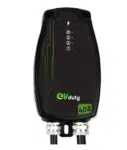
- Price: $799 for Standard, $899 for Smart-Home, and $1,199 for Smart Pro.
- Charging level: Level 2
- Power output: 9.6 kW
- Voltage: 208-240 VAC (voltage alternating current)
- Amperage: 40 A
- Operating temperature: -40°C to 40°C
- Connector type: SAE J1772
EVduty-50 portable specifications
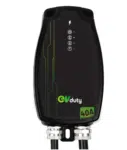
- Price: $799 for Standard, $899 for Smart-Home, and $1,199 for Smart Pro.
- Charging level: Level 2
- Power output: 9.6 kW
- Voltage: 208-240 VAC (voltage alternating current)
- Amperage: 40 A
- Operating temperature: -40°C to 40°C
- Connector type: SAE J1772
EVduty-60 specifications
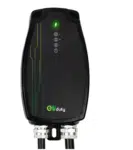
- Price: $999 for Smart-Home, $1,299 for Smart-Pro
- Charging level: Level 2
- Power output: 11.52 kW
- Voltage: 208-240 VAC (voltage alternating current)
- Amperage: 48 A
- Operating temperature: -40°C to 40°C
- Connector type: SAE J1772
The EVduty-50 fixed and portable stations can provide up to 9.6 kW of power, while the EVduty-60 station provides up to 11.52 kW of power. Each charger can operate in temperatures as low as -40°C and as high as 40°C. Upgrading to the Smart Home or Smart Pro allows you to schedule, monitor, and control your charging sessions. Each charger has an SAE J1772 connector type, making them compatible with most fully electric vehicles and all plug-in vehicles. Tesla vehicles are not compatible with the EVDuty chargers, but customers can purchase a Tesla NEMA plug adapter.
ChargePoint
ChargePoint has an extensive network of EV charging stations that spans the globe. Canadian EV drivers can purchase the ChargePoint Home Flex charging station. The model comes in three versions: Hardwired, NEMA 6-50 Plug, and NEMA 14-50 Plug. Each version has two connector options: NACS for Teslas and J1772 for all other EVs.
Home Flex hardwired specifications
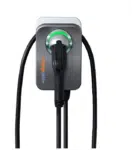
- Price: $899
- Charging level: Level 2
- Power output: 12 kW
- Voltage: 208/240 V
- Amperage: 16-50A
- Operating temperature: -30°C to 50 °C
- Connector type: SAE J1772 and NACS
NEMA 6-50 Plug specifications
- Price: $959
- Charging level: Level 2
- Power output: 12 kW
- Voltage: 208/240 V
- Amperage: 40 A
- Operating temperature: -30°C to 50 °C
- Connector type: SAE J1772 and NACS
NEMA 14-50 Plug specifications
- Price: $959
- Charging level: Level 2
- Power output: 12 kW
- Voltage: 208/240 V
- Amperage: 40 A
- Operating temperature: -30°C to 50 °C
- Connector type: SAE J1772 and NACS
Each charger model can provide up to 12 kW of power, with an approximate charging time of 59 kilometres of range per hour. operate in temperatures between -30°C to 50°C. Each model has both J1772 and NACS Tesla connectors, making them compatible with every EV model.
Buy on the ChargePoint store
Lectron
Lectron is a major EV charger manufacturer of Level 1 and Level 2 charging stations. The company also offers accessories, including EV adapters (e.g., Tesla to J1772 adapter), charger pedestal stands, and a socket splitter.
Two Level 1 chargers are available. The chargers provided either 1.65 kW or 1.44 kW at 15 A. Both models are IP65 weather-resistant and have built-in protection against overvoltage, overcurrent, and short circuits. The chargers also have smart features that are controlled via the Lectron app. Lastly, the chargers are only compatible with EVs that use the J1772 standard, it is not compatible with Tesla vehicles.
Lectron Level 1 NEMA 5-15 Standard

- Price: Starting at $238
- Charging level: Level 1
- Power output: Up to 1.65 kW
- Voltage: 120 V
- Amperage: 15 A
- Operating temperature: -30°C to 50°C
- Connector type: SAE J1772
Lectron Level 1 NEMA 5-15 with app control

- Price: Starting at $224
- Charging level: Level 1
- Power output: Up to 1.44 kW
- Voltage: 120 V
- Amperage: 15 A
- Operating temperature: -30°C to 50°C
- Connector type: SAE J1772
Four Level 2 chargers are available, one of which is portable. These chargers can provide between 9.6-11.5 kW of power, and some models have adjustable amperage (16 to 48 A). Each model has an IP65 weather rating, which means the chargers are suitable for indoor and outdoor use. Plus, the portable versions have a 16-foot cable for improved accessibility. The V-Box Tesla version and the two portable chargers have smart features that can be used via the Lectron App.
Lectron NEMA 14-50
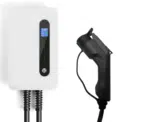
- Price: Starting at $503
- Charging level: Level 2
- Power output: Up to 9.6 kW
- Voltage: 240 V
- Amperage: 40 A
- Operating temperature: -30°C to 50°C
- Connector type: SAE J1772
V-Box NEMA 14-50 Tesla

- Price: Starting at $629
- Charging level: Level 2
- Power output: Up to 11.52 kW
- Voltage: 240 V
- Amperage: 16, 32, 40, & 48 A
- Operating temperature: -30°C to 50°C
- Connector type: NACS
V-Box NEMA 14-50 J1772
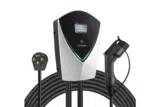
- Price: Starting at $699.99
- Charging level: Level 2
- Power output: Up to 11.52 kW
- Voltage: 240 V
- Amperage: 16, 32, 40, & 48 A
- Operating temperature: -30°C to 50°C
- Connector type: J1772
Lectron Portable Level 2 EV Charger J1772
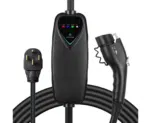
- Price: Starting at $419
- Charging level: Level 2
- Power output: 9.6 kW
- Voltage: 240 V
- Amperage: 16, 32, 40, & 48 A
- Operating temperature: -30°C to 50°C
- Connector type: J1772
Lectron Portable Level 2 EV Charger-Tesla
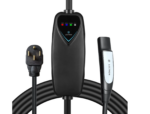
- Price: Starting at $433
- Charging level: Level 2
- Power output: 9.6 kW
- Voltage: 240 V
- Amperage: 16, 32, 40, & 48 A
- Operating temperature: -30°C to 50°C
- Connector type: NACS
Lastly, Lectron offers a portable Level 1 and 2 EV charger. Both have dual-level charging capabilities, enabling drivers to switch between 12 amps and 40 amps, and 110 volts to 240 volts. One model has a J1772 connector type, while the other has a Tesla NACS connector type. A significant benefit of both versions is the flexibility they provide; the chargers can be used at home or on the go. The chargers are lightweight, compact, and easy to carry. Plus, both chargers have a 16-foot cable, making it easy to reach an outlet. The J1772 model starts at $429.9,9 while the Tesla model starts at $503.
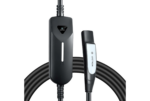

Frequently asked questions
How do I install an EV charger, and how much does it cost?
Level 1 home EV chargers are fairly easy to install as they can be plugged into a standard wall outlet. Level 2 chargers are high-voltage appliances and can be dangerous if installed incorrectly. Therefore, we recommend hiring a licensed electrician to handle the job. You may also need to apply for an electrical permit to install an EV charger.
To learn more about installing a home EV charger, click here
How much power does a home EV charger use?
The answer to this question depends on the charging level as well as the specific model. Other factors include the battery size of your EV and your driving behaviour. In other words, the more you drive, the more electricity will be used by the charger. But in general, a Level 2 charger uses around 7.2 kilowatts of electricity per day. Other sources place the figure at 11.81 kWh per day. The monthly average usage is approximately 353.3 kWh, while the yearly average is roughly 4,310.65 kWh.
Where can I buy a home EV charger?
There are several online retailers that sell EV charging stations. For example, A2ZEV sells various charger brands, including Grizzl-E models. Retailers such as EVBase sell charging accessories, such as Tesla to J1772 charger adapters or charger plug covers. And oftentimes, you can purchase an EV charger directly from the manufacturer’s website.
What is the fastest home EV charger?
Pinning an exact number to this question is difficult, as there are multiple factors that impact charging speeds. For example, charging in cold weather has been known to produce slower charging times. Charging speeds can also differ between brands. But in general, EV chargers with higher power outputs can provide fast charging speeds. For example, the ChargePoint NEMA 14-50 charger has a power output of 12 kW. The estimated charge time for the NEMA 14-50 is 3 hours 43 minutes.
The EV Vehicle Charging Time Calculator provides an estimated charge time for your EV charger. You can also use a charging mobile app to see your charger’s power output and charging speed.
What are the pros and cons of a home EV charger?
Owning a home EV charger comes with some pros and cons. To start, a benefit of a home EV charger is the convenience and accessibility it provides. It will save you from searching for public charging stations in your area. Plus, you will not have to wait for the charging unit to become available. While the initial cost for a home charging unit is expensive, there are potential cost savings in the long run. Home charging in general can be more cost-effective than public charging, especially if you live in an area with ultra-low overnight rates. A home EV charger also gives you greater control over the charging process. For example, with a home smart charger, you can schedule your charging session and control how much electricity is drawn by the EV.
As mentioned above, a downside of home EV chargers is they have an expensive price tag. Installation costs can be high as well. Charging speeds can be slow depending on the brand and your home’s electrical panel (e.g., up to 8 hours). If you need quick charging times, you may have to visit a public station with DC fast chargers. Home EV chargers can also increase your electricity bill. This will depend on your charging habits; for example, charging your EV during peak electricity usage (usually from 4 p.m. to 9 p.m.).
*Disclaimer: A previous version of our buying guide included chargers from Enel X Way. However, the company decided to close its electric mobility business in Canada and the U.S. as of October 11, 2024. Enel X Way’s charger models will remain for an interim period while a third-party firm seeks a permanent solution. In response to the update, we have removed the Enel X Way section of the buying guide.
To learn more, click here











